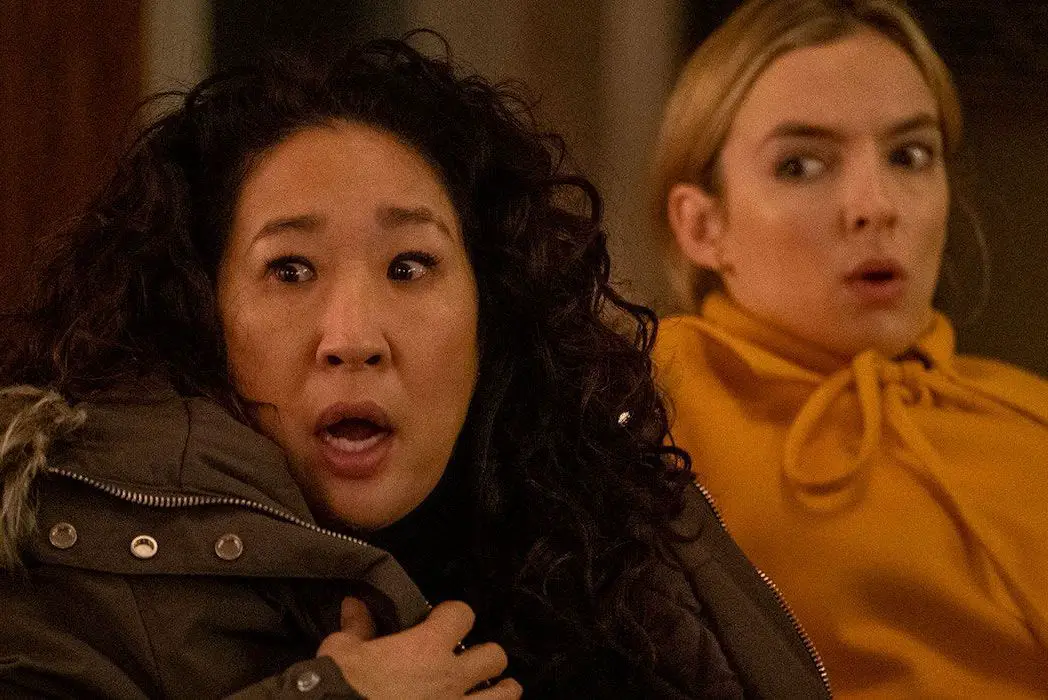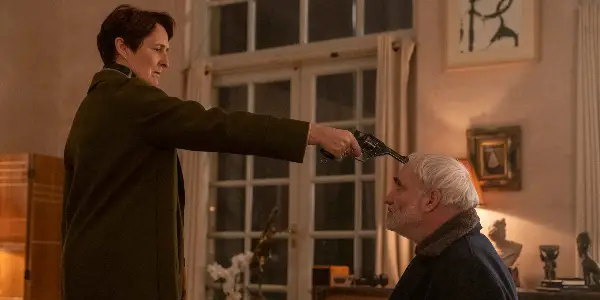KILLING EVE (S3E8) “Are You Leading Or Am I?”: Dancing To The Same Old Tune

Reyzando Nawara is a passionate film and TV enthusiast from…
Killing Eve may have started as a procedural drama about a psychotic assassin and a messy yet brilliant MI6 agent. But at its core, the show has always been about female desire, told from the perspectives of two polar opposite women, the titular Eve (Sandra Oh), and her target/object of desire Villanelle (Jodie Comer). Whether they’re trying to catch one another in a dangerous and flirtatious cat-and-mouse game or attempting to understand their mutual obsession with each other, it’s the focus on the inexplainable push-and-pull dynamic between the two of them that remains the biggest highlight of the show.
That’s why when season three decides to delve deeper into the procedural element, and sidelines the twisted relationship between Eve and Villanelle in favor of more individual moments, the show began to lose its sass. What was once electric now becomes rudimentary. Even when the showrunner, Suzanne Heathcote, tries to make it up during this week’s finale, the pairing between these two leading ladies just doesn’t feel earned at all as the whole season is too busy entangling an uninspired espionage conspiracy instead of focusing on its main allure.
Unsatisfying Conclusion
The problems, however, do not just stop with the season’s lack of focus on Eve and Villanelle as a pair. But also with how premature the conclusion of the season’s overarching narrative is. The mystery surrounding Kenny’s (Sean Delaney) death does not have a proper closure. We still don’t have any answers to what’s really happened to him or who killed him. The whole investigation into The Twelve, once again, ends pretty abruptly. All the arcs of the new characters conclude in really unsatisfying ways, and that includes Dasha (Harriet Walter), the only newcomer whose story gets fleshed out a bit more than the others. And don’t get me started on Niko (Owen McDonnell) too.

It’s really unfortunate, given how talented the ensemble is, especially Fiona Shaw, who despite having to work with the same formulaic stuff each episode, still manages to dazzle any time she’s on-screen. It’s clear that what Heathcote wants to achieve this season is more retrospective arcs for the three lead characters. But by doubling down on the investigative element, which by the way keeps getting tiring each episode, the show gets robbed from achieving what Heathcote sets out to do in the first place.
Take, for instance, Carolyn’s arc. Throughout the season, Carolyn is challenged to be more in touch with her feelings, especially after Kenny’s death in the first episode. But instead of trusting Shaw to carry that challenge alone, the show chooses to heavy-handedly bring a new character, Geraldine (Gemma Whelan), on board to do that task. On top of that, there’s barely a single moment when we’re allowed to access Carolyn’s grief deeply except from that one scene when she unloads her feelings to Mo Jafari (Raj Bajaj) for the first time. So when at the end of this episode we see her finally acknowledging her inability to articulate her feelings, it seems more like a cheap storytelling device rather than genuine character development.
That’s not the only thing in season three that feels like a last-ditch effort though. We don’t get the answer to Kenny’s death through Carolyn and Eve’s relentless investigation, but rather from Bear’s (Turlough Convery) hidden camera at Bitter Pill. Out of all the things that could’ve happened this season, a hidden camera? Really? It’s so frustrating, isn’t it, having to invest ourselves for eight weeks just to have this ridiculous conclusion?

The final confrontation where Carolyn decides to spare Konstantin (Kim Bodnia) instead of Paul (Steve Pemberton), doesn’t seem to make any sense either. Of course, to have Bodnia coming back next season is always a welcome. His performance is hilarious and delightful. But plot-wise, nothing about this decision has a strong logic except to prolong Konstantin’s wild-card presence. If the show really wants to entangle The Twelve next season, then killing Paul, a character who has a connection with the organization, seems like a bad decision.
Losing Appeal
Still, the biggest hole of the season is the one where the writers have put Eve and Villanelle’s arcs into. When the season begins, both of these characters are in a mess. But unlike Villanelle who forces herself to discover more progressive things, including finding out her roots and shedding her old past life for good, Eve remains stagnant in one place. At first, it looks like Eve is progressing when she throws herself back to investigating The Twelve. But as the season unfolds, it’s getting obvious that there’s really no depth to her whole arc as if she’s just used by the writers to move the plot forward.
We don’t exactly know how she processes all the tragedy that’s happening to her this season. She’s just there doing nothing except to sit at Bitter Pill office or confront Carolyn any way she can. Even in her most monumental moment of the show yet, her nearly killing Dasha at last week’s episode, it looks more like a shallow villainous act instead of the culmination of Eve’s dark impulse that’s been hinted throughout three seasons. The problem isn’t in Oh’s performance. She remains phenomenal despite not having meaty materials to work with. But it’s more in the writers who seem lost on how to examine Eve’s psyche more deeply. That’s why when at the end of the season finale we see Eve coming to terms with her feelings toward Villanelle, it doesn’t feel like the climax of Eve’s growth this season.

The mutual infatuation that Eve and Villanelle always have toward each other also doesn’t feel balanced at all this season. Eve seems to be more obsessed with being together with Villanelle than she was in season one and two. And that shouldn’t be a problem if we know what is it that she really wants out of their relationship. But the problem is, the show doesn’t provide us any of that. We only see that Eve wants to be with Villanelle because all she sees in her future is just her and her only, not because Eve wants to understand something inside her that she’s been struggling to figure out for so long.
Villanelle, on the other hand, doesn’t share the same equal obsession anymore. Yes, there’s always a little spark within her that only Eve can lit. We know that for sure. But aside from the bus fiasco in the earlier episode, there’s really not much in her actions that show how badly she wants Eve in her life. In fact, it almost looks like Villanelle has gone far beyond Eve this season. She’s growing to be a new person not because of Eve, but rather because it’s really what she wants.
It’s obvious at this point that the writers have more handle on telling Villanelle’s story rather than Eve’s, which shouldn’t be an issue if the show is actually about Villanelle’s journey of gaining her humanity back. But as mentioned earlier, Killing Eve is not just about Villanelle, it’s always been a tale of two women. That’s why none of the decisions that Heathcote has made this season in regards to Eve and Villanelle’s complicated relationship works well in deepening the show’s thesis on these two women’s desires. It almost feels like the show forgets that it has Eve’s name in its title.
Final Thought
While there are some joys to be found throughout the season finale, like when Carolyn tells Geraldine to get out of her house or when Eve tries to come up with a fake name, “Are You Leading or Am I?”, in the end, culminates in an anti-climatic fashion. Every answer to the season’s overarching narrative doesn’t feel satisfying, and the show also loses its main appeal on Eve and Villanelle’s mutual obsession. How next season will make sense of this finale remains to be seen, but it’s definitely not gonna be an easy job for Laura Neal (confirmed showrunner for season 4) to get out of the mess that this season has left her.
What do you think of the ending? Let us know in the comments!
All eight episodes of Killing Eve season three are available to stream on AMC and BBC iPlayer.
Watch Killing Eve
Does content like this matter to you?
Become a Member and support film journalism. Unlock access to all of Film Inquiry`s great articles. Join a community of like-minded readers who are passionate about cinema - get access to our private members Network, give back to independent filmmakers, and more.
Reyzando Nawara is a passionate film and TV enthusiast from Indonesia. When he's not watching TV and movies, he likes to cook and make sorbet.













